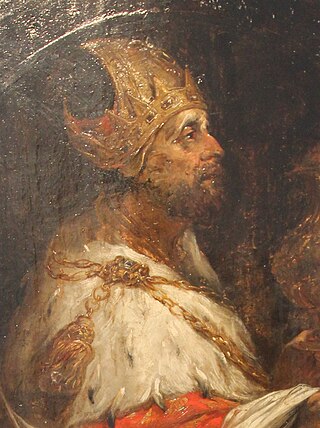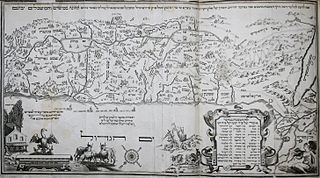Related Research Articles

Abraham is the common Hebrew patriarch of the Abrahamic religions, including Judaism, Christianity, and Islam. In Judaism, he is the founding father of the special relationship between the Jews and God; in Christianity, he is the spiritual progenitor of all believers, whether Jewish or non-Jewish; and in Islam, he is a link in the chain of Islamic prophets that begins with Adam and culminates in Muhammad. As the namesake of the Abrahamic religions, Abraham is also revered in other Abrahamic religions, such as Druze Faith and Baháʼí Faith.
The Book of Numbers is the fourth book of the Hebrew Bible and the fourth of five books of the Jewish Torah. The book has a long and complex history; its final form is possibly due to a Priestly redaction of a Yahwistic source made sometime in the early Persian period. The name of the book comes from the two censuses taken of the Israelites.

The Book of Judges is the seventh book of the Hebrew Bible and the Christian Old Testament. In the narrative of the Hebrew Bible, it covers the time between the conquest described in the Book of Joshua and the establishment of a kingdom in the Books of Samuel, during which Biblical judges served as temporary leaders.
Aner refers, in the Hebrew Bible, to:

Chedorlaomer, also spelled Kedorlaomer, is a king of Elam mentioned in Genesis 14. Genesis portrays him as allied with three other kings, campaigning against five Canaanite city-states in response to an uprising in the days of Abraham.

Lot was a man mentioned in the biblical Book of Genesis, chapters 11–14 and 19. Notable events in his life recorded in Genesis include his journey with his uncle Abraham; his flight from the destruction of Sodom and Gomorrah, during which his wife became a pillar of salt, and being intoxicated by his daughters so they could have incestuous intercourse with him to continue their family line.
The Promised Land is Middle Eastern land in the Levant that Abrahamic religions claim God promised and subsequently gave to Abraham and several more times to his descendants.
The Hittites, also spelled Hethites, were a group of people mentioned in the Hebrew Bible. Under the names בני-חת and חתי they are described several times as living in or near Canaan between the time of Abraham and the time of Ezra after the return of the Jews from the Babylonian exile. Their ancestor was Heth.

A handmaiden is a personal maid or female servant. Depending on culture or historical period, a handmaiden may be of enslaved status or may be simply an employee. The terms handmaiden and handmaid are synonyms.
Anak is a figure in the Hebrew Bible. His descendants are mentioned in narratives concerning the conquest of Canaan by the Israelites. According to the Book of Numbers, Anak was a forefather of the Anakim, a Rephaite tribe according to Deuteronomy 2:11. In their report, ten of the twelve Israelite spies associated the Anakim with the Nephilim of Genesis 6:1–4.

Lech-Lecha, Lekh-Lekha, or Lech-L'cha is the third weekly Torah portion in the annual Jewish cycle of Torah reading. It constitutes Genesis 12:1–17:27. The parashah tells the stories of God's calling of Abram, Abram's passing off his wife Sarai as his sister, Abram's dividing the land with his nephew Lot, the war between the four kings and the five, the covenant between the pieces, Sarai's tensions with her maid Hagar and Hagar's son Ishmael, and the covenant of circumcision.

According to the Hebrew Bible, Phinehas was a priest during the Israelites' Exodus journey. The grandson of Aaron and son of Eleazar, the High Priests, he distinguished himself as a youth at Shittim with his zeal against the heresy of Peor.

In the Hebrew Bible, Melchizedek, also transliterated Melchisedech, Melchisedec or Malki Tzedek, was the king of Salem and priest of El Elyon. He is first mentioned in Genesis 14:18–20, where he brings out bread and wine and then blesses Abram, and El Elyon or "the Lord, God Most High". Abram was returning from pursuing the kings who came from the East and gave him a "tenth of everything".

Alcoholic beverages appear in the Hebrew Bible, after Noah planted a vineyard and became inebriated. In the New Testament, Jesus miraculously made copious amounts of wine at the wedding at Cana. Wine is the most common alcoholic beverage mentioned in biblical literature, where it is a source of symbolism, and was an important part of daily life in biblical times. Additionally, the inhabitants of ancient Israel drank beer and wines made from fruits other than grapes, and references to these appear in scripture. However, the alcohol content of ancient alcoholic beverages was significantly lower than modern alcoholic beverages. The low alcohol content was due to the limitations of fermentation and the nonexistence of distillation methods in the ancient world. Rabbinic teachers wrote acceptance criteria on consumability of ancient alcoholic beverages after significant dilution with water, and prohibited undiluted wine.

The Battle of the Vale of Siddim, also often called the War of Nine Kings or the Slaughter of Chedorlaomer, is an event in the Hebrew Bible book of Genesis 14:1–17 that occurs in the days of Abram and Lot. The Vale of Siddim was the battleground for the cities of the Jordan River plain revolting against Mesopotamian rule.

The Land of Israel is the traditional Jewish name for an area of the Southern Levant. Related biblical, religious and historical English terms include the Land of Canaan, the Promised Land, the Holy Land, and Palestine. The definitions of the limits of this territory vary between passages in the Hebrew Bible, with specific mentions in Genesis 15, Exodus 23, Numbers 34 and Ezekiel 47. Nine times elsewhere in the Bible, the settled land is referred as "from Dan to Beersheba", and three times it is referred as "from the entrance of Hamath unto the brook of Egypt".

According to the Hebrew Bible, the Tribe of Zebulun was one of the twelve tribes of Israel. Following the completion of the conquest of Canaan by the Israelite tribes in the Book of Joshua, Joshua allocated the land among the twelve tribes. The territory Zebulun was allocated was at the southern end of the Galilee, with its eastern border being the Sea of Galilee, the western border being the Mediterranean Sea, the south being bordered by the Tribe of Issachar, and the north by Asher on the western side and Naphtali on the eastern.
References
- ↑ Easton on Eshcol. - On their way back they explored the route which led into the south (the Negeb) by the western edge of the mountains at Telilat el-’Anab, i.e., 'grape-mounds', near Beersheba. "In one of these extensive valleys, perhaps in Wady Hanein, where miles of grape-mounds even now meet the eye, they cut the gigantic clusters of grapes, and gathered the pomegranates and figs, to show how goodly was the land which the Lord had promised for their inheritance.", Palmer’s Desert of the Exodus.
- ↑ The Wycliffe Bible Encyclopedia notes that the valley is still very fruitful.
![]() This article incorporates text from a publication now in the public domain : Easton, Matthew George (1897). "Eshcol". Easton's Bible Dictionary (New and revised ed.). T. Nelson and Sons.
This article incorporates text from a publication now in the public domain : Easton, Matthew George (1897). "Eshcol". Easton's Bible Dictionary (New and revised ed.). T. Nelson and Sons.